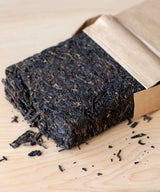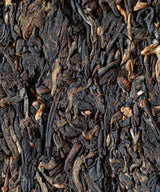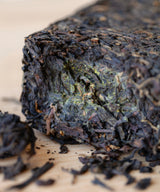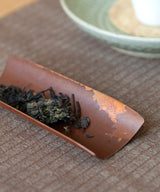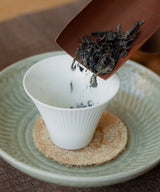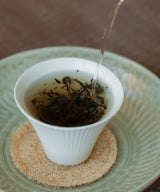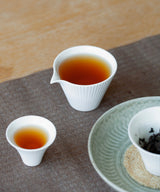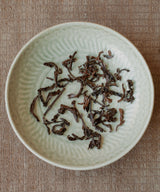Yunnan Red Heicha
滇红金花黑茶
Harvest
April 2020
Origin
Fengqing, Yunnan
Heicha 黑茶 is a fermented tea from the Hunan province in China. It is a lesser known tea, however its craftsmanship has a very rich tradition worth describing in detail. The preparation of Hei Cha dates back to the Tang Dynasty in the 9th century. Traditionally there are ten steps in crafting it: the tea is fermented, steamed, slowly roasted over charcoal, and then compressed into dense bricks.
Part of the wonder of Hei Cha, and why it is so highly regarded, is that, as the brick of tea ages, many little “golden flowers” 金花 form on it. These flowers are a probiotic called Eurotium cristatum. Over centuries of human interaction with them, these golden flowers have come to be understood as a very precious substance. Firstly, they contain enzymes that catalyze the breakdown of proteins in tea leaves, turning them into sugars, thus making the tea taste sweeter and more smooth. Secondly, the golden flowers convert the polyphenols in tea into beneficial and more available substances for the human body. Eurotium Cristatum is also found in thousand-year old reishi and cordyceps mushrooms, and has been the subject of medical research for a very long time.
While it’s makers use very traditional craftsmanship and work in small batches, this Yunnan Red Hei Cha is an experimental tea. Normally Hei Cha would be prepared using tea from big-leaf trees high in the mist-covered mountains of the Hunan province. With this tea, the makers have used black tea from the Yunnan province instead. The black tea from Yunnan, harvested in 2018, is a blend of delicate bud-and-leaves from 300 years old arbor trees. When fermented as a Hei Cha, it is transformed into something a bit unbelievable.
It is as though this experiment has added an invisible milk to the Yunnan black. The enzymes from fermentation have produced an incredible softness, and a sweetness. In the mouth, the spaces in the structured tannins of the black tea have been filled with something dense and even. When the tea is first prepared it tastes like dulce de lece. After a few infusions the sweetness gives way to the taste of dried leaves. The auburn coloured liquor gradually intensifies with each infusion – never getting as dark as a fermented pu’erh, but still pointing towards the earth. For being so fascinating, it is a very comforting and grounding tea to drink.
. . .
Brewing guide
The key to brewing this tea is to use boiling water, and very fast infusions, starting at 10 seconds.
| Tea | 4 g |
| Temperature |
100°C |
| Water | 120 ml |
| Steep time | 10 - 60 sec |
| No. of infusions | 8 |

